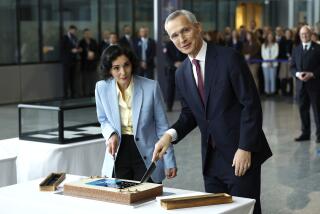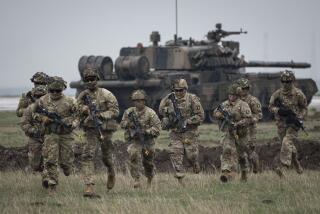NATO Expects Major Impact on Its Policy
- Share via
BRUSSELS — NATO said Wednesday that the shattering events in the Soviet Union will have a major effect on the Western alliance’s policy and that a new era of international relations has begun.
It was the first time that the alliance, set up in 1949 to face what the West perceived as a threat from Moscow, had publicly acknowledged that the new Soviet revolution would affect its own political and military aims.
“There was general agreement that events in the Soviet Union signal a new era in international relations and will undoubtedly have a major effect on the future policy of the alliance,” said a NATO spokesman after a meeting of ambassadors from the 16 member nations.
The North Atlantic Treaty Organization had almost completed a new political and military strategy for the post-Cold War era when hard-liners bungled a coup intended to oust Soviet President Mikhail S. Gorbachev last month.
Diplomats say changes may now have to be made to the NATO policy, which continued to see the Soviet Union as the top security risk to the West.
“There is a feeling of caution, lest we should act too quickly,” said one NATO source. Another diplomat said it was not yet clear how the changes in the Soviet Union would affect alliance policy--only that they would.
Although Soviet armed forces are being purged of hard-line officers, it is not yet clear whether they will be under central control or commanded by the republics. There are also questions about the Soviet nuclear arsenal, the world’s biggest.
“We have to see if the military potential is seriously weakened before we draw any conclusions about our own defense spending cuts and whether they should be speeded up,” said another official.
There may also have to be changes in arms control policy on cutting troop levels and nuclear weapons in Europe.
Germany, backed by many other European nations, pressed its NATO allies Wednesday to start negotiations on cutting short-range nuclear forces as soon as possible.
Most of NATO’s so-called battlefield nuclear weapons--artillery shells and missiles--are based in Germany. The alliance has already decided not to modernize them, but preparations for planned U.S.-Soviet talks on cutting these arms have dragged for months.
More to Read
Sign up for Essential California
The most important California stories and recommendations in your inbox every morning.
You may occasionally receive promotional content from the Los Angeles Times.













